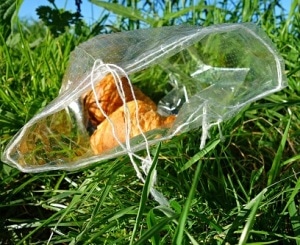Jan 17 2019
University of Nottingham researchers have developed 100 percent biodegradable and edible food packaging made from plant carbohydrates and proteins to replace:
- Polluting plastic materials and
- Improve storage, safety and shelf life

The Sino-UK project is led by Professor Saffa Riffat, from the Faculty of Engineering, whose research group is world-renown for innovations in sustainable materials, energy and building technologies.
This includes their investigations into the structure and functionality of sustainable natural materials such as plant polysaccharides (carbohydrates) and proteins to develop advanced materials for applications in:
- Buildings,
- Energy technologies,
- Packaging
- And beyond
Plant-derived Plastic Film for Food Packaging
Using a special technical approach, the team is working on plastic films derived from konjac flour and starch, cellulose or proteins that are fully edible and harmless if accidentally eaten by people or animals - unlike health issues associated with microplastics and other plastic waste that make their way into the food chain.
The researchers have found that plant carbohydrate and protein macromolecules bond together into a special network structure during the film-forming process. The network structure provides the film with a required mechanical strength and transparent appearance for the film to be used as packaging materials.
The project is jointly investigated by Marie Curie Research Fellow, Professor Fatang Jiang, an expert in biodegradable polysaccharide materials for:
Prof Riffat, also a Fellow of the European Academy of Sciences and President of World Society of Sustainable Energy Technologies, said: “While plastic materials have been in use for around a century, their poor degradability is now known to cause serious environmental harm. This has led to more stringent recycling targets and even bans coming into force.
“Queen Elizabeth, for example, banned plastic straws and bottles from the royal estates in February 2018, and the EU plans to make all plastic packaging recyclable or reusable by 2030. We need to find degradable solutions to tackle plastic pollution, and this is what we are working on now.”
Functional Properties of Packaging to Increase Shelf Life
Fully-biodegradable bags could not only solve the safety and pollution issues of food packaging materials, but also efficiently lengthen the shelf life of fruit and vegetables and other fresh produce.
“In addition to being edible, degradable, strong and transparent, the packaging materials we are working on have low gas permeability, making them more air tight. This feature cuts moisture loss, which slows down spoilage, and seals in the flavor. This is of great importance for the quality, preservation, storage and safety of foods,” Professor Riffat adds.
The primary market for these plant-based packaging materials will be superstores and food supply chains. The research team is also aiming to advance the technology for general packaging in construction, express delivery and magazines, etc. The project, currently supported by the £220K Horizon 2020 Marie Curie fellowship, will last two years with the potential to extend for another three to five years if further funding is secured.